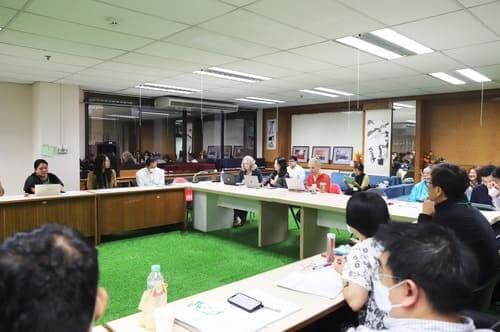Academic Collaboration
Home > Internationalization > Academic Collaboration
Welcome to the Research Institute for Languages and Cultures of Asia (RILCA), a dynamic hub of academic and research collaboration at the forefront of promoting Sustainable Development Goals (SDGs). At RILCA, we are committed to fostering interdisciplinary partnerships with esteemed universities and organizations worldwide. Our collaborative endeavors are designed to create a rich tapestry of knowledge and innovation, bridging diverse disciplines to address global challenges. Through these synergies, we strive to contribute meaningfully to sustainable development, cultural understanding, and societal progress. Join us in exploring the transformative power of collaborative research and education, as we work together towards a more sustainable, inclusive, and interconnected world.
Norwegian Ministry of Foreign Affairs – RILCA Empowerment: Creating Refugees, Migrants as Agents of Positive Change
Amid Myanmar’s political upheaval, a diverse group seeks refuge in Thailand, including students, teachers, doctors, and professionals. Recognizing the pivotal role of education in sustainable development, the project focuses on addressing challenges for students and volunteer teachers in achieving educational equality. Professional concerns, such as lacking essential training, hinder quality education delivery, impacting both teachers and learners. Adapting to a new environment is challenging due to language barriers and legal constraints. The Research Institute for Languages and Cultures of Asia (RILCA) at Mahidol University aims to positively impact lives by proposing a targeted capacity-building program for these individuals, integrating a Global Citizenship course to foster understanding and cooperation in the broader context of their new community.
Rockefeller Foundation – Capacity Building Workshop on Multiculturalism, Medical Pluralism, and Communication for Healthcare Professionals
The International Workshop on ‘Multiculturalism, Medical Pluralism, and Communication for Healthcare Professionals’ reinforces the Rockefeller Foundation’s dedication to Health and Economic Equity. ASEAN is a diverse region with numerous ethnicities, languages, and cultures. Healthcare professionals in ASEAN often encounter patients or people from various backgrounds. Economic inequity is another concern in ASEAN. There are issues regarding income disparities, urban-rural divide, financial inclusion, gender inequality affecting many aspects of well-being in the region. The knowledge on intercultural competency can raise awareness, promote inclusivity among all, and facilitate successful communication among those with different sociocultural backgrounds. In addition, local healthcare systems in ASEAN countries can vary significantly. Local ways of life, local beliefs can also affect both health and communication issues. Personal cultural awareness and open-mindedness of individual healthcare professionals therefore play a crucial role in their intercultural competency. Intercultural competency, gained through awareness and inclusivity promotion, facilitates effective communication. Varied local healthcare systems and beliefs in ASEAN underscore the importance of individual healthcare professionals’ cultural awareness. Small group discussions in the workshop enhanced participants’ understanding of CLMVT languages, cultures, and well-being issues. Effective communication with diverse ethnic backgrounds is crucial for trust and quality care. Ongoing education, cultural sensitivity programs, and a commitment to addressing health disparities are vital for healthcare professionals to possess adequate intercultural competency, ensuring quality healthcare and an inclusive society where no one is left behind.
SOAS – Language, Culture, and Sustainable Community Development: Taking the Conversation Further
The Research Institute for Languages and Cultures of Asia (RILCA) is delighted to partner with the School of Oriental and African Studies (SOAS) in a groundbreaking two-year project, ‘Language, Culture, and Sustainable Community Development: Taking the Conversation Further,’ generously supported by the British Academy. Spearheaded by Prof. Julia Sallabank from SOAS and Asst. Prof. Sumittra Suraratdecha from RILCA, this initiative initially focused on capacity-building workshops at Mahidol University in 2021-22 to enhance writing skills for Early and Mid-career Researchers, adapting to virtual formats due to COVID-19. As we evolve, the project aims to expand its scope significantly. The next phase includes in-depth coverage of academic writing, research methodologies, soft skills, and addressing structural inequalities in career development, underpinned by a commitment to mentorship and fostering interdisciplinary and international collaboration. The shift to in-person workshops promises a richer, more interactive learning environment, facilitating networking, process writing, co-authorship, and a comprehensive approach to building sustainable academic communities and enhancing global research dialogues.
‘Reducing Indigenous Inequalities’ project under the Worldwide University Network (WUN)
The ‘Reducing Indigenous Inequalities’ project under the Worldwide University Network (WUN) addresses the profound impacts of colonial, postcolonial, and globalizing forces on indigenous communities. These factors have led to deep-seated insecurities, inequality in resource distribution, loss of heritage, and cultural homogenization, severely marginalizing ethnic minorities and their traditional knowledge. With young people migrating due to the perceived unattractiveness of traditional lifestyles, socio-economic challenges have intensified. This project acknowledges the vital role of intergenerational partnerships and community empowerment across all age groups in sustaining indigenous rights and heritage. Recognizing the unique socio-cultural-political contexts of different regions, our approach is comparative, aiming to identify effective strategies and policies that can address these varied challenges in local contexts. As part of our commitment to Sustainable Development Goal 10, focusing on reducing inequalities, this collaborative network of interdisciplinary experts aims to promote social inclusion, economic growth, and environmental protection. We seek to share, exchange, and review international lessons and best practices, thereby contributing to the universal goals of social, economic, and political inclusion, ensuring equal opportunities, and ending discrimination. This initiative is a testament to our dedication to developing holistic and context-sensitive solutions for indigenous empowerment globally.
We are proud to partner with a prestigious consortium of experts from the University of Alberta, University of Cape Town, Maastricht University, Mahidol University, The University of Sheffield, University of Leeds, University of Warsaw, SOAS, University of London, Tokyo University of Foreign Studies, Meio University, Universiti Malaya, and the Society for Endangered and Lesser-known Languages (India), each bringing unique insights and invaluable contributions to this vital research endeavor. … read more












